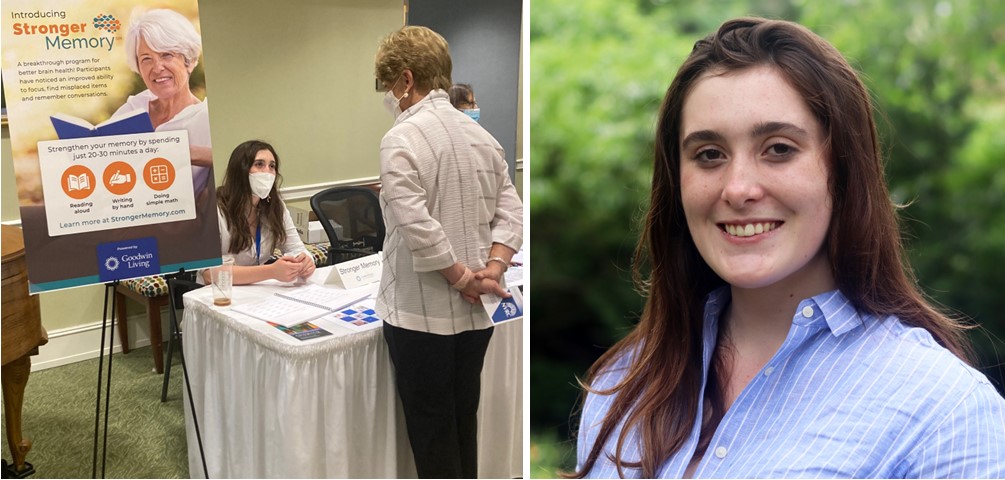
Staff Stories - July 24, 2022
By Kathryn Fronabarger, Goodwin Living Intern
Every three seconds, someone in the world is diagnosed with dementia. That’s the time it takes to say that sentence aloud, which is frightening to process.
Thankfully, during my six-week internship with the Brain Health department for Goodwin Living, I saw the quality of life that can be achieved after diagnosis. Empathy, perspective and humanity are the three skills I realized will progress us further in our treatment of this disease. Fortunately, they’re all skills we can all learn.
In my first week at Goodwin Living, I started by conceptualizing what I could both understand and implement in just six weeks. Quickly I realized that, rather than looking at the despondency we normally feel around dementia, my service would have more impact if I focused on the day-to-day quality of life I could bring not just to those experiencing dementia, but to the broader community. And what I could bring to others’ quality of life was this simple truth: gratification and personhood can be achieved in all stages of life, even if they appear in different forms.
One of the first places I learned about gratification and personhood in all stages of life was in music therapy sessions. Music therapy is a hands-on activity during which residents express themselves through voice or instrument. At first, just like me, many residents had initial fear and awkwardness in missing a beat or singing when nobody else was. After just a few songs, though, I could feel their zeal and energy in the music.
Another joyous memory I will cherish is getting to form interpersonal bonds with many of the residents in the Small House Health Care Center at Goodwin House Alexandria. As unique as each of us believes we are, we all share our humanity. In recognizing what we share, it can make it easier to relate to nearly everyone. I got to partake in meaningful conversations with residents about hopes for the future as well as goofy tangents about the end of the dinosaurs.
Working at Goodwin Living has taught me that galvanizing the moment is what matters, and that success is felt vicariously through the happiness of others.
As I started to understand more about the various facets of the Goodwin Living Brain Health department, I took a particular interest in the StrongerMemory program. StrongerMemory is designed to stimulate the brain’s prefrontal cortex, which governs our ability to retrieve memories. Participants spend 20 to 30 minutes a day reading aloud, writing and quickly completing simple math problems. Statistically, StrongerMemory has proven to help reduce or stabilize cognitive decline.
There was just one problem in my view: how is math fun? While I couldn’t make math itself fun, I remembered how it felt to improve my accuracy and speed of problem-solving years ago and sought to spend my time seeking to provide short term gratification for completing the math section of the StrongerMemory workbook. I developed a technique that involved finger counting and tapping as a dynamic memory aid and showed that technique to participants, with the goal of giving confidence and ease back to those seeking improvement.
Towards the close of my internship here at Goodwin Living, I can say that I leave with a newfound optimism for the care of older adults and a new understanding of the possibility for meaningful innovation in this field. In the future, I would love to see entirely personalized memory care plans, dependent on a person’s individual priorities, become the standard not just at places such as Goodwin Living, but a standard in all of health care.
Additionally, I am optimistic about the benefits of multi-model learning, including kinesthetic activity for those experiencing dementia. I am excited to see individuals push the boundaries of what they believe to be their capabilities. I have hope that other organizations that serve older adults will use the Goodwin Living model of holism to preserve the integrity, individualism and energy of each and every person. I have made it a goal to share this model of care to families seeking guidance with an older adult.
Interning alongside Belle Arze and Jose Santamaria was a joy, and serving with Peri Weinfeldt, Jessica Fredericksen and Theresa Mandela allowed me the opportunity to dip my toe into the future of humanity-based brain health.
Another highlight of my Goodwin Living internship was time spent with my resident mentor, Jane Picot. I cherish the encouragement and companionship that Jane provided to me this summer, and I’m looking forward to continue corresponding with her in the future.
Finally, I would like to express my gratitude to the Goodwin Living Foundation for funding this internship program through the generosity of donors to the Anderson Fund. Thanks to this Goodwin Living internship, I have greater optimism for the future of our nation’s older adults.
Kathryn Fronabarger is a rising senior of Tulane University studying evolutionary biology and ecology. Her passion drives her to speak on behalf of the voiceless and marginalized. During the summer of 2022, Kathryn worked as an intern with the Goodwin Living Brain Health Team.
